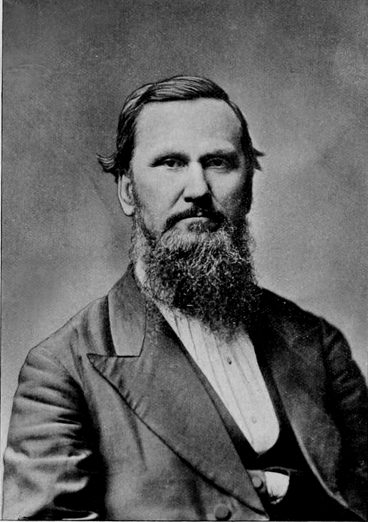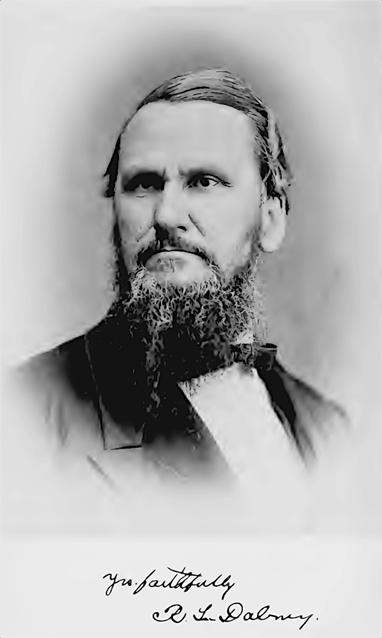Robert L. Dabney (1820 - 1898AD)

American
theologian and teacher.
Robert Lewis DABNEY, D.D. (Hampden-Sidney College, 1853), LL.D. (do., 1872), Presbyterian (Southern) ; b. in Louisa County, Va., March 5, 1820; after studying in Hampden-Sidney College, Va., to the beginning of senior year, he entered the University of Virginia, Charlottesville, took the whole M.A. course, then the full theological course in Union Theological Seminary, Va., and graduated in 1846; became missionary in Virginia, 1846; pastor of Tinkling-Spring Church, Augusta County, Va., 1847; professor of church history in the Union Theological Seminary, Va., 1853, and of theology in the same institution, 1869; professor of philosophy, mental, moral, and political, in the State University of Texas, Austin, 1883 (his health requiring a milder climate). From 1858 till 1874 he was co-pastor of the Hampden-Sidney College Church. In 1861 he was a chaplain in the Confederate army, with the Virginia troops; in 1862, chief of staff of the Second Corps under Gen. T. J. Jackson. In 1870 he was moderator of the Southern General Assembly. He has published Memoir of Dr. F. S. Sampson, Richmond, 1854; Life of Gen. Thomas J. Jackson, New York, 1866; Defence of Virginia and the South, 1867; Treatise on Sacred Rhetoric, Richmond, 1870, 3d ed. 1881; Sensualistic Philosophy of the Nineteenth Century examined, New York, 1875; Theology, Dogmatic and Polemic, Richmond, 1874, 3d ed. 1885. [from Schaff-Herzog Enc. Religious Knowledge 1894AD edition]
“When the dark cloud of Civil War settled over our land, Dr. Dabney exerted himself to allay excitement and preserve peace and the Union. His trenchant articles written at that time met with warm commendation in the North as well as in the South. True to the Constitution and its doctrine of the Sovereignty of States, he enlisted in the Confederate Army as chaplain, and became General “Stonewall” Jackson’s Chief of Staff. More than once he distinguished himself for coolness and courage, and near Port Republic in the Valley campaign his prompt action averted disaster from the army, for which his modesty alone prevented him from receiving the credit he deserved.”
“He was a matchless teacher. He possessed a clear, powerful intellect, which grasped the substance of the most profound philosophical themes and made them plain. He had had that close contact with men, that practical experience of affairs, which enabled him to present difficult subjects in their relation to the thought and needs of every-day life. He exemplified the difference between a learned book-worm, who knew his subject only from a theoretical viewpoint, and the profound master who presented it in relation to the actual experience of his hearers. Dr. Dabney had that rare gift of making systematic theology not a study of dry bones, but a living system, most interesting and instructive, because throbbing with reality and power. Dr. W. G. T. Shedd of Union Seminary, New York, in the old days, himself an acute and learned scholar, once said that in his judgment Dr. Dabney was the greatest living theologian.” [extracts from memorial address by Henry M. Woods 1936AD]
SYSTEMATIC AND POLEMICAL THEOLOGY
The Five Points of Calvinism (160k) zip (43k)
The Gospel Idea of Preaching (30k) zip (10k)
True Courage (81k) commemoration of “Stonewall” Jackson in 1863AD zip (26k)
Secularized Education. (74k) zip (25k)
The Attractions of Popery. (76k) zip (24k)
Arminian Theory of Redemption. (part 1 of 2) (48k) zip (15k)
Arminian Theory of Redemption. (part 2 of 2) (57k) zip (16k)
Predestination (part 1 of 2) (65k) zip (17k)
Predestination (part 2 of 2) (63k) zip (17k)
Repentance (60k) zip (15k)
Perseverance of the Saints. (111k) pdf (79k) docx (32k)

From a photograph by C. H. Erambert, Farmville, Va.
extracts from "DISCUSSIONS" in 4 volumes.
1. A Biographical Sketch of Robert L. Dabney (106k) by C. R. Vaughan, published 1890AD pdf (62k) docx (37k)